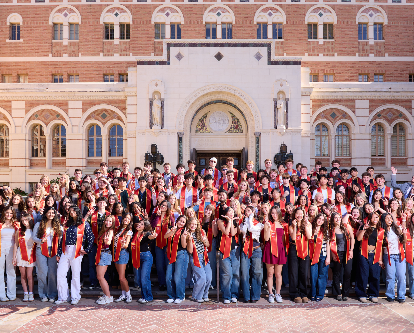
USC Marshall Welcomes First Early Decision Cohort
Through tours, panels, and on-campus festivities, USC Marshall celebrated members of the Class of 2030 who were admitted as part of the school’s inaugural early decision program.
2024 Web3 Fall Forum Explores Shifting Blockchain Landscape
2024 Web3 Fall Forum Explores Shifting Blockchain Landscape
In the wake of the 2024 election, the annual forum convened experts and faculty to discuss new crypto policy, stablecoins, and the intersection of AI and blockchain.

Blockchain is no longer the future. It is the present.
That was the sentiment at the 2024 Web3 Fall Forum on November 21, which brought together thought leaders, faculty, students, enthusiasts, and the curious for a series of panels and fireside chats centered around the revolutionary technology. Hosted by the VanEck Digital Assets Initiative (VEDA), the forum explored the state of cryptocurrencies like Bitcoin, the role of stablecoins, and the application of artificial intelligence (AI) to the technology.
“For the first time in history, blockchain as a frontier technology is now starting to become recognized and accepted as a sound investment through digital assets and catalysts for societal progress and innovation — not just by us builders and entrepreneurs who are scrappy and trying to make things, but on the level of nation states and institutions,” said Eric Chung, managing director of VEDA.
Since its foundation in 2022, VEDA has served as a gateway for those interested in blockchain — be it cryptocurrencies, digital assets, NFTs, or the metaverse. With an emphasis on education, research, and community events like the Fall Forum, the initiative has striven to develop and expand the evolving sector.
The event was co-hosted by Blockchain@USC, a student organization dedicated to blockchain research, education, and growth. As Bitcoin reaches all-time highs in value, the group’s president Chase Jeter encouraged the audience to welcome new enthusiasts into USC’s crypto community.
“The thing that I love most about this industry is how the community really doesn’t care what your background is,” Jeter said in his remarks. “It really doesn’t matter who you are — young, old, degreed, not degreed … As long as you are passionate about the space and are willing to contribute to this space, there’s a place for you in this space.”
The forum kicked off with a panel discussion moderated by Anthony Borquez, co-director of VEDA and a professor of the practice in entrepreneurship. The conversation focused on the partnership between panelists Scott Duke Kominers, research partner at a16z crypto and professor at Harvard Business School; and Steve Kaczynski, co-founder of dGen Network. The two co-authored a book together called The Everything Token: How NFTs and Web3 Will Transform the Way We Buy, Sell, and Create.
Kominers observed that the evolution of blockchain and the growth of its community could impact a number of sectors, from finance to gaming and beyond.
“The set of people involved in crypto circa 2021 is a tiny set of people,” Kominers said. “But the set of people who own digital goods today in the United States — much less globally — is massive. I think we’re going to see this technology come to underpin many different use cases.”
Borquez echoed Kominers’ observations, commenting that, as digital assets increase in value and use, VEDA hopes to empower more students to use the technology in their businesses.
“Our mission with VEDA is to build curriculum and build community,” Borquez said. “Me personally: I’m here because I want to help provide future entrepreneurs with the tools, the co-founders, and the insights to help them become creators and build incredible projects.”
The surface area for opportunities is vast. Whether you’re an entrepreneur or a researcher or a teacher, now is the time for you to dive in.
— Eric Chung
Managing Director, Van Eck Digital Assets Initiative
There are numerous paths to get involved with blockchain technology in the market. One of these ways is stablecoins, cryptocurrencies whose value is linked to an existing currency. This connection lowers the volatility of the asset, which can be a barrier for people who are concerned about the inherent risk.
In the the fireside chat, “Stablecoins — What Product-Market Fit Looks Like,” James Healy, VEDA co-director and adjunct professor of finance and business economics, and Brandon Allen, application security engineer at Paxos, discussed the role stablecoins may yet play in widening the cryptocurrency tent.
According to Allen, part of that growth may derive from the incoming administration’s loosening of crypto regulations, enabling new opportunities for those in the community.
“This is a great time to be in crypto, to be learning more about crypto, to be learning more about the industry,” Allen explained. “This is the moment where things are going to really start to change.”
USC’s support of cutting-edge technology and entrepreneurial efforts was evident in the next panel, “The USC Student Founder Experience.” Amelia Daly, VEDA’s executive-in-residence and head of partnerships at Solana Foundation, moderated the discussion with three student and alumni founders: Jai Bhavnani, co-founder of Royco, Luca Cordova Stuart, co-founder of Noise, and Dana DeGenius PhD ’24, co-founder of DAIN.
Stuart, a current USC Marshall student, highlighted the wide range of resources available to student founders within VEDA. In a constantly shifting industry, his advisors in the Trojan Network, such as Eric Chung, guide his decisions and motivate him to adapt to new environments.
Bhavani offered a similar perspective. According to the founder, his company Royco — which catalyzes “on-chain” transactions and negotiations — still benefits from the Trojan Network. Specifically, the venture capital space has aided the launch and growth of his crypto business.
The final discussion, “Permissionless Intelligence,” examined the intersection of AI and blockchain. Chung moderated the panel that featured two USC Viterbi School of Engineering professors, Bhaskar Krishnamachari and Sean Ren, and DeGenius’ DAIN co-founder, Ryan Trat.
For the panelists, the futures of AI and blockchain are equally uncertain, but communities like the one formed at VEDA can help create a roadmap.
“I always say this at blockchain events: [the crypto industry] is like flying an airplane while it’s still being built,” Krishnamachari said. “It’s always risky and exciting.”
Trat, whose company DAIN works to integrate AI across multiple platforms and systems, believes the advent of artificial general intelligence (AGI) will change the face of many industries. AGI refers to a theoretical model of AI that can think and learn like a human, effectively surpassing human cognitive abilities.
Though the technology isn’t there yet, the prospect of AGI chills some people. Trat, however, believes the crypto market will be ready for the transformation.
“If AGI does come and you do have intelligent autonomous systems that are able to function on a higher level than humans, I think that we’re in a good spot,” Trat said. “You have to be building for what could be done tomorrow, what could be done in two years, what could be done in 10 years. But I think that crypto in general is in a good spot for when that does happen.”
While it may be difficult for some experts to predict what the world will look like in five years, the faculty and students in VEDA believe that blockchain will be a major part of that future — a future that’s already begun.
“The surface area for opportunities is vast. Whether you’re an entrepreneur or a researcher or a teacher, now is the time for you to dive in,” Chung said.
VEDA will continue to lead the discourse at their annual Blockchain Conference on March 11, 2025.
RELATED
USC Marshall Welcomes First Early Decision Cohort
Through tours, panels, and on-campus festivities, USC Marshall celebrated members of the Class of 2030 who were admitted as part of the school’s inaugural early decision program.
USC Marshall and USC Leventhal Celebrate the Power of Philanthropy
The annual scholarship celebration event connects student scholarship recipients with the donors who support them.
Rethinking Audit Regulation: Why Testing Should Come Before Mandates
Leventhal professor Clive Lennox proposes a new approach to audit regulation to measure policy effectiveness prior to broad implementation.
Arkley Advisory Council Member Spotlight: Jeffrey C. Terry
The USC alumnus, Arkley Council board member, and executive vice president and managing director of Hub International discusses his unlikely educational route and the challenges facing the insurance industry.
From AI Club to Google Internship: A Q&A with Student Leader Francesca Kubica
MAIA executive director and Marshall student Francesca Kubica discusses student leadership and translating AI education into industry experience.